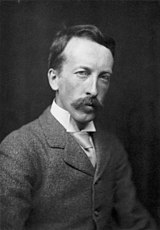William Henry Hadow
|
Sir William Henry Hadow MA, CBE, Hon. D Mus |
|
|---|---|
 |
|
| Vice-Chancellor of the University of Durham | |
|
In office 1916–1918 |
|
| Preceded by | The Very Rev'd Prof Henry Gee |
| Succeeded by | John Stapylton Grey Pemberton |
| Vice-Chancellor of the University of Sheffield | |
|
In office 1919–1930 |
|
| Preceded by | William Ripper |
| Succeeded by | Arthur Wallace Pickard-Cambridge |
| Personal details | |
| Born | 1859 |
| Died | 1937 |
| Spouse(s) | Edith Troutbeck |
| Alma mater | Worcester College, Oxford |
| Profession | Academic, Educationalist and Vice-Chancellor |
Sir William Henry Hadow CBE (27 December 1859 – 8 April 1937) was a leading educational reformer in Great Britain and a musicologist.
Born at Ebrington in Gloucestershire and baptised there on 29 January 1860 by his father, he was the eldest child of the Reverend William Elliot Hadow (1826-1906) and his wife Mary Lang Cornish (1835-1917). His grandfather, the Reverend William Thomas Hadow, had married Eleanor Ann Bethune, daughter of Colonel John Drinkwater Bethune.
He studied at Malvern College, followed by Worcester College, Oxford, where he taught and became Dean (1889). In 1905, Hadow was elected the first Old Malvernian member of the Council of Malvern College. In 1909, he was appointed principal of Armstrong College in the Newcastle Division of Durham University before succeeding, as Warden & Vice-Chancellor of the University of Durham in 1916. In 1919, he was appointed the Vice-Chancellor of Sheffield University (1919–30).
As chairman of several committees, he published a series of reports on education, notably The Education of the Adolescent (1926) which called for the re-organization of elementary education, the abandonment of all-age schools, and the creation of secondary modern schools. These became known as the Hadow Reports. He was a leading influence in English education at all levels in the 1920s and 1930s.
Hadow wrote a number of publications on music and music theory, including the Oxford History of Music which he wrote and edited. He was a composer. He was also a Member of the Council of the Royal College of Music.
...
Wikipedia
